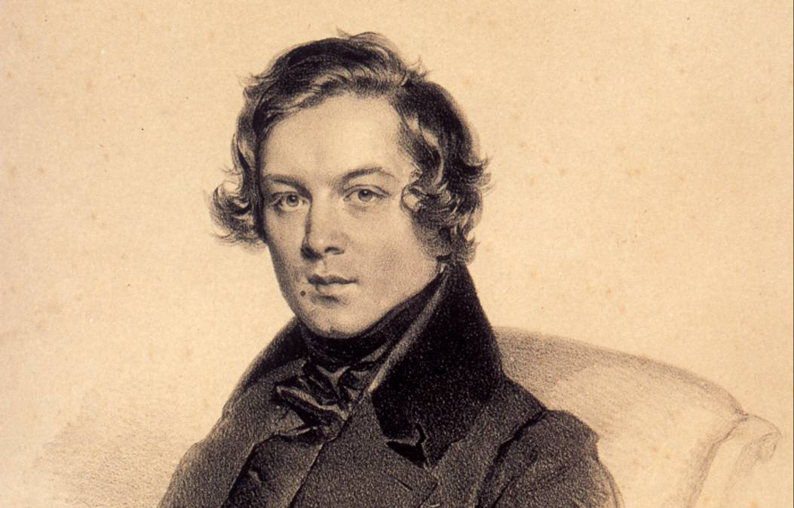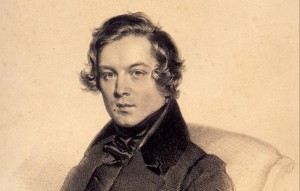Many years ago, when I first attempted a complete Schumann cycle with an orchestra, I knew the Violin Concerto would have to be part of it, if only because, after a lifetime as a professional musician, I had yet to hear a live performance.
In fact, it was nearly completely lost to history thanks to the intrigues of Joseph Joachim, for whom it was written. Schumann wrote the Concerto in 1853 and Joachim read it with his orchestra that year, but he had not learned it properly, and claimed his arm was tired from conducting (I’ll remember that one for my own use). Joachim promised to give Schumann a better hearing, admitting “I did it such injustice,” but despite repeated promises to play it to Schumann at the asylum in Endenich, Schumann never heard the Concerto again. Joachim did occasionally read parts of of the work with colleagues, and played the piece through with Clara Schumann in 1855 in celebration of the Schumann’s 15th wedding anniversary.
However, Brahms, Joachim and Clara eventually came to the conclusion that the Violin Concerto was a failure- Joachim went so far as to use phrases like “mental lassitude,” “bewildering passages,” “morbid brooding,” and “tiresome repetitions.” Together, the three decided the piece should never be published, and the manuscript was finally bequeathed by Joachim to the Prussian State Library with the stipulation that it not be published until 100 years after the composer’s death.
It was Joachim’s niece, Jelly d’Aranyi (for whom Bartok wrote both of his violin sonatas and Ravel wrote Tzigane) who first brought the lost concerto to the world’s attention. An avid spiritualist, she claimed Joachim had told her about it in a spiritual visitation. In the end, however, her Jewish heritage meant she could never give the first performance in Germany in 1937. Instead, the utilitarian violinist Georg Kulenkampf premiered the piece, but with cuts, and with the solo part extensively re-written by Hindemith (whose contributions had to remain uncredited because he had since become labeled as a “degenerate musician” by the Nazi state).
The first performance of the score as Schumann wrote it was finally given a month later by Yehudi Menuhin , first in a violin and piano reduction at Carnegie Hall, then with the New York Philharmonic under the baton of another great violinist, Georges Enescu.
Since 1937, the work has had its champions, notably Joshua Bell and Gidon Kremer in recent years, but it remains a rarity. Even now, there is no full score available(UPDATE- as of 10.10.2009 Breitkopf has finally published a new Urtext edition of the work, which is wonderful news), only a pocket score. As I’ve gotten to know the piece, I’ve found that I completely disagree with Brahms, Clara and Joachim- it’s a wonderful, deeply moving work, although I think that had Joachim come through on his promises of a premiere while Schumann was still well enough to hear it, he might have made a few small revisions.
Its continuing neglect may be attributable to the lingering effects of a painful birth. Perhaps the piece was a reminder of a traumatic time that Schumann’s three friends wanted to forget- there is too much great music in it for them to have mistaken it so badly otherwise. Critics and commentators have always been tempted to make outbursts of rare stupidity on the subject of Schumann in general, and his late music in particular, and the Concerto is very difficult to play for the soloist. Joachim obviously found it too challenging, and this was the man for whom Brahms wrote all his violin music.
On the other hand, I think the Schumann Violin Concerto will always be music for a special state of mind- like the late music of Beethoven, long passages of it seem to already be part of another world, particularly the almost unbearably tender and fragile slow movement. Like the best late music of many composers, Schumann already seems to be living partly in the beyond.
The first movement shares some of the rhapsodic and otherworldly qualities of the first movements of the Schumann Piano and Cello concertos, but the key of D minor (Schumann was very conscious of the historical associations of keys in the music of the past, and this movement has references to D minor works including the first movement of Beethoven 9 and the Bach Chaconne) gives the music an extra dimension of power, existential dread and struggle. The brief slow movement, on the other hand, is intimate and fragile- one of the most beautiful in the repertoire. This is music that lives in a twilight realm of ephemeral visions, longings and hauntings. However, as in the other two concerti, Schumann leaves behind the sensitive and vulnerable side Eusebian side of his nature in the Finale, in which his confident, extrovert and optimistic Florestan persona comes to the fore in a jolly, virtuosic finale that pushes the soloist to the limits of the possible.
KW
Advice for the curious- the best resource on this work I know of is the marvelous essay by my drinking buddy Michael Steinberg in The Concerto, on which I have leaned heavily in writing this.


Great article on my favorite composer’s glorious Violin Concerto. I’ve known the piece for several years through recordings (Zehetmair’s w/ Eschenbach and the Philharmonia remains my favorite) and was fortunate to finally hear it live with Isabelle Faust and the Berlin Philharmonic (Sakari Oramo conducting) on January 24th of this year.
Keep up the great writing on Schumann. I continue to enjoy your ariticle on Schumann’s brilliance as an orchestrator, which he indeed was.
Since John Daverio’s death several years ago we’ve not had a true champion for our composer. Nice to know we have another one now – and one who’s on the podium putting into practice what he preaches.
Hi Dan-
Great to hear from you, and thanks for the kind words. Hopefully you’ll be a happy man with the upcoming Schumann anniversary year. SMP and I are continuing our Schumann cycle with the 4th (in the final version) later this spring, and I”m also doing the 2nd with the Cheltenham Symphony in May. I really think the fiddle concerto is very special- hopefully Alexandra and I can record it one of these years. She played it magnificently.
Thanks again for writing!
Ken
Thanks for your response Ken. It’s pretty cool to correspond with a real live conductor!
I am looking forward to next year and hope to get to Germany for some Schumann concerts. I’m a member of the Robert Schumann Gesselschaft in Dusseldorf and will probably head for that area.
If I can get to Oregon next October I’ll be at your concert featuring the Second Symphony. Having heard it in Berlin, Paris, Philadelphia, Houston, Dallas, and San Antonio it might be time to add Pendleton to the list.
And I hope to be able to pick up any and all Schumann recordings you make in future.
Keep up the good work!
I’m supposed to be doing something else, but I have become obsessed with the Schumann Violin Concerto in recent months, having never heard it at all until last year. That I heard it then was an accident – trying to collect everything that Schumann wrote in time for the double centenary I found a recording in a charity shop. Now I cannot get enough of it and I cannot image why this remarkable music has been ignored by so many front rank artists. I need to hear it in the concert hall and I am sorry that I missed your performance of it. However, as I have moved from London to near Guildford, Surrey, I will make it my duty to attend your concerts. A major concert organiser told me in the summer that Schumann had had ‘a bum deal’ as far as his double centenary was concerned even in his own concert series, which did at least include all the symphonies played by the Bremen Chamber Orchestra – superb! And I lashed the editor of Gramophone for the same reason, calling him
a Philistine of the 21st Century! He didn’t like it, but he gave scant space to Schumann and his music. Keep up the good work.
Dear Peter
Great comment- thanks for writing. You might also be interested in my Dec 7 concert with Orchestra of the Swan in Stratford. We’re doing Schumann and Gal 3rd symphonies. It’s a great programme, and the beginning of a major recording project to do all four symphonies by both of these under-rated masters. Hopefully we can do the Schumann concerti as well.
I have read somewhere that Schumann’s D-minor concerto was original composed as a cello concerto. Is there any truth to this?
I don’t believe so- it was written for his friend Joseph Joachim. There is, however, and arrangement of the Schumann Cello Concerto for Violin and Orchestra made by Schumann himself (also made for Joachim), which may be the source of the confusion.